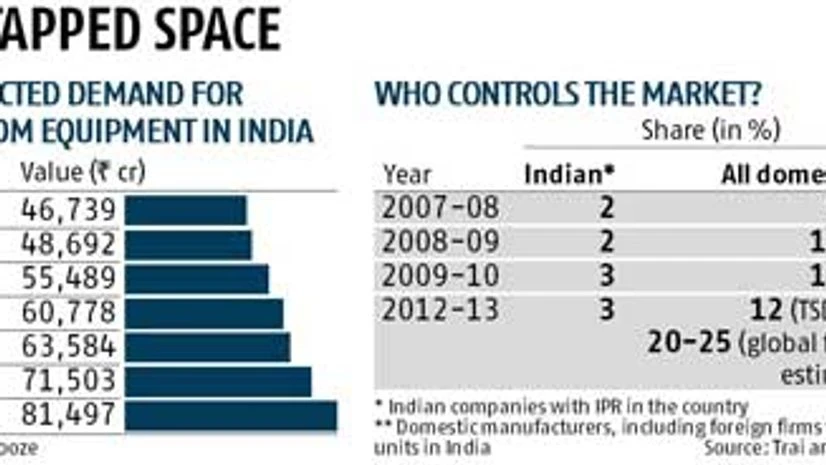Indian companies will constitute 6.6 per cent of the global demand for telecommunication equipment in 2014-15, according to research agency Ovum. The industry expects it will spend Rs 46,000 crore on buying gear, excluding handsets. The bulk of this money will, however, be spent on buying imported equipment, mainly from Europe and China.
According to the Telecom Systems Design and Manufacturing Association (TSDMA), Indian firms that design and manufacture and also have intellectual property, had a three per cent share of the nearly-Rs 50,000-crore telecom equipment market in 2012-13. Adding foreign companies that have factories in India raises the share to 10-12 per cent.
But the value added in India is less than 11 per cent. The work here is limited to system integration and packaging. The design and the intellectual property, which constitutes a large part of the value addition in telecom gear, resides abroad.
The Telecom Equipment Manufacturers' Association paints an even more grim picture. Its chairman N K Goyal says the Indian market for core network equipment, excluding towers and batteries, is worth around Rs 25,000 crore but local firms do not contribute more than Rs 1,000 crore.
Attempts to coax foreign equipment manufacturers to set up facilities in India were made a few years ago through clauses in Bharat Sanchar Nigam Ltd's (BSNL's) orders that required domestic production. Of late, these clauses are not insisted upon.
In February 2012, the government announced a preference policy in which 30 per cent of the orders of government departments would be reserved for local telecom gear makers, which would have to undertake a minimum value addition of 25 per cent. The policy extended the quota to the private sector, too, asking it to source sensitive equipment from local manufacturers.
But the government had not factored in lobbying by groups like the US-Indian Business Council against what they described was a violation of India's commitments to the World Trade Organization. Succumbing to pressure, the Cabinet cleared a watered-down policy. Telecom service providers, which account for the bulk of the market, do not need to buy sensitive gear from local vendors. Telecom equipment manufacturers from Israel, South Korea and Taiwan decided to drop plans for joint ventures in India after the government flip-flop.
Also, government orders requiring local sourcing did not materialise. Indian manufacturers complain tenders by the government and state-owned telecommunication companies spell out restrictive clauses, such as earlier experience in delivery of similar equipment or networth rules, that keep them from bidding.
"Many government tenders impose restrictive clauses. For example, they insist on a track record. But if we have developed a new technology, how can we show a track record, unless we are given a chance," asks Sanjeev Kakkar, advisor to TSDMA.
BSNL has put out an order for routers to cater to the Rs 15,000-crore national network for spectrum project with the condition that the manufacturer should have deployed a substantial number of similar products (like routers) in the country. No Indian manufacturer can meet this condition.
In contrast, when the South Korean government decided to adopt the CDMA technology, it followed it up with a policy to back local manufacturers. Seoul identified five South Korean companies and gave them an initial order of one million handsets each.
The rest is history.
It is also more costly to make telecom gear in India because of the scale of the global manufacturers. "Indian manufacturers face a (cost) disadvantage of between 20 per cent and 27 per cent against foreign companies that import," says Goyal of the Telecom Equipment Manufacturers' Association. Finished telecom equipment can be imported at zero duty, but components bear a duty ranging from 10 per cent to 15 per cent. Indian telecom gear makers pay 16-18 per cent interest on loans, far above their Chinese rivals. Infrastructure costs like power are higher here as well.
While most global telecom gear companies declined to comment on their imports, a source in Huawei said only a fourth of its $800 million worth of equipment sold in India was made locally. He added importing from China was 30 per cent cheaper.
The telecom equipment business is controlled by five companies - Huawei, ZTE, Ericsson, Nokia Siemens, and Alcatel - which have financial muscle to heft in big deals. With managed services, where equipment companies build and maintain networks for telecom service providers, it has become a high-roller's game.
These companies get support from their governments. Chinese banks have billions of dollars in credit lines for companies buying Chinese equipment. The banks offer credit at two per cent interest, payable in 15-20 years and the interest becomes due only from the fifth year. "Which Indian manufacturer can compete against that? We are looking for the best deal. Why should we bother whether the gear is homemade or foreign? We pass the benefit to the consumer in low tariffs," says a senior executive at a telecom services company that buys most of its equipment abroad.
It is a fair call for telecom services companies fighting a bitter battle for subscribers. Unless, of course, the government steps in to boost local production. That would mean changing the inverted duty structure, charging lower licence fees if telecom companies buy Indian, providing funds for research, and raising import duty on products made in India. Some say India should learn from China, which asked foreign companies to transfer intellectual property if they wanted to sell equipment.
Some tentative steps have been taken. State-owned Railtel and Power Grid Corporation have local sourcing in their contracts. And Indian companies have outbid international competitors for contracts by the new special-purpose vehicle set up by the government to implement the national fibre-optic network. The government intends that by 2019-20, only 20 per cent of telecom equipment in the country should be imported. At the moment, that seems like a pipe dream.

)
